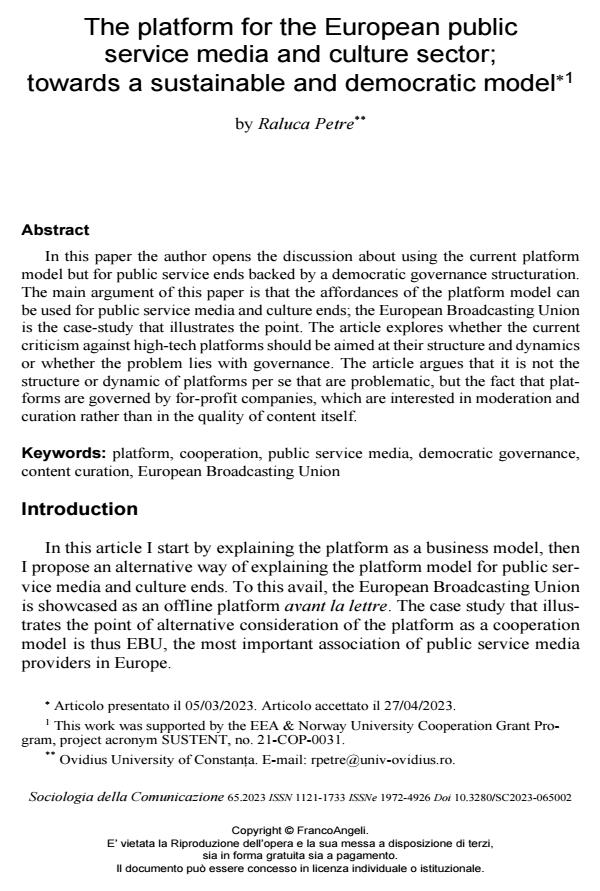The platform for the European public service media and culture sector; towards a sustainable and democratic model
Journal title SOCIOLOGIA DELLA COMUNICAZIONE
Author/s Raluca Petre
Publishing Year 2023 Issue 2023/65
Language English Pages 18 P. 13-30 File size 286 KB
DOI 10.3280/SC2023-065002
DOI is like a bar code for intellectual property: to have more infomation
click here
Below, you can see the article first page
If you want to buy this article in PDF format, you can do it, following the instructions to buy download credits

FrancoAngeli is member of Publishers International Linking Association, Inc (PILA), a not-for-profit association which run the CrossRef service enabling links to and from online scholarly content.
In this paper the author opens the discussion about using the current platform model but for public service ends backed by a democratic governance structu-ration. The main argument of this paper is that the affordances of the platform model can be used for public service media and culture ends; the European Broadcasting Union is the case-study that illustrates the point. The article explores whether the current criticism against high-tech platforms should be aimed at their structure and dynamics or whether the problem lies with governance. The article argues that it is not the structure or dynamic of platforms per se that are problem-atic, but the fact that platforms are governed by for-profit companies, which are interested in moderation and curation rather than in the quality of content itself.
Keywords: platform, cooperation, public service media, democratic governance, content curation, European Broadcasting Union
- Bardoel J., Ferrell Lowe G. (2007), From Public Service Broadcasting to Public Service Media: RIPE@2007, NORDICOM, Gothenburg.
- Berger P., Luckmann T. (1966), The Social Construction of Reality: A Treatise in the Sociology of Knowledge, Penguin Books, New York.
- Bloch-Wehba H. (2020), Automation in Moderation, in «Cornell International Law Journal», 53, pp. 41-96.
- Bonini T., Mazzoli M. (2022), A convivial-agonistic framework to theorise public service media platforms and their governing systems, in «New Media & Society», 24(4), pp. 922–941. DOI: 10.1177/1461444822107903
- Boudreau J.K., Hagiu A. (2011), Platforms rules: multi-sided platforms as regulators, in Gawer A. (ed.), Platforms, markets and innovation, Edward Elgar Publishing, Cheltenham.
- Brown A., Fishenden J., Thompson M., Venters W. (2017), Appraising the impact and role of platform models and Government as a Platform (GaaP), in UK Government public service reform: Towards a Platform Assessment Framework (PAF), in «Government Information Quarterly», 34(2), pp. 167-182.
- Directive (EU) 2018/1808 of the European Parliament and of the Council of 14 November 2018 amending Directive 2010/13/EU. https://eur-lex.europa.eu/eli/dir/2018/1808/oj
- Directive (EU) 2019/790 of the European Parliament and of the Council of 17 April 2019 on copyright and related rights in the Digital Single Market and amending Directives 96/9/EC and 2001/29/EC. https://eur-lex.europa.eu/eli/dir/2019/790/oj
- European Broadcasting Union, 2022, Funding of Public Service Media. Media Intelligence Service, Geneva.
- Gawer A., Cusumano M. (2015), How Companies Become Platform Leaders, in «MIT Sloan Management Review», Sloan Select Collection.
- Griffin R. (2022), The Sanitised Platform, in «JIPITEC – Journal of Intellectual Property, Information Technology and E-Commerce Law», 13 (1), pp. 35-52.
- Hagiu A. (2014), Strategic Decisions for Multisided Platforms, in «MIT Sloan Management Review», Winter 2014. https://sloanreview.mit.edu/article/strategic-decisions-for-multisided-platforms/
- Hagiu A., Kester W.C. (2008), MBA programs as multi-sided platforms, HBS Working Paper.
- Hagiu A., Wright J. (2015), Multi-Sided Platforms, in «International Journal of Industrial Organization», 43, pp. 162-174.
- Hesmondhalgh D. (2017), Why it matters when big tech firms extend their power into media content, in «The Conversation» https://theconversation.com/why-it-matters-when-big-tech-firms-extend-their-power-into-media-content-86876
- Moe H. (2008) Dissemination and dialogue in the public sphere: a case for public service media online, in «Media, Culture & Society», 30 (3), pp. 319-336. DOI: 10.1177/016344370808879
- Petre R. (2017), Early Empowerment and Discursive Agency: teenage users on the Internet, in Neagu, Tomescu (eds.), Information and Persuasion Studies in Linguistics, Literature, Culture, and Discourse Analysis, Peter Lang, Berlin, pp. 216-230.
- Petre R. (2018), Public Service Media Between the State and the Public: re-centring public service media options for the new democracies, in «The Annals of Ovidius University of Constanța: Philology Series», XXIX (2), pp. 121-126.
- Primorac J., Bilić P., Uzelac A. (2022), Platformisation of Cultural and audio-visual Sectors in the European Union: New Policies for New Stakeholders, in «Media Studies», 26, pp. 2-9.
- Raats T. (2019), Moving Fast or Moving Forward? The Shift From a Partnership Agenda to Collaboration as the True Fabric of Public Service Media, European Broadcasting Union, Geneva.
- Regulation (EU) 2022/2065 of the European Parliament and of the Council of 19 October 2022 on a Single Market For Digital Services and amending Directive 2000/31/EC (Digital Services Act). -- https://eur-lex.europa.eu/legal-content/EN/TXT/?uri=celex%3A32022R2065
- Taylor P. (2021), Insanely Complicated, Hopelessly Inadequate, in «London Review of Books», 43(2), pp. 37-40.
- Valtýsson B. (2020), Digital Cultural Politics: From Policy to Practice, Palgrave Macmillan.
- van den Bulck H., Moe H. (2018), Public service media, universality and personalisation through algorithms: mapping strategies and exploring dilemmas, in «Media, Culture & Society», 40(6), pp. 875–892. DOI: 10.1177/016344371773440
- van Dijck J., de Waal M., Poell T. (2018), Platform Society, Oxford University Press, New York.
- Wright D. (2022), How culture became digital: editor’s introduction, in «International Journal of Cultural Policy», 28:7, pp. 776-785. DOI: 10.1080/10286632.2022.213716
- Zutshi A., Grilo A. (2019), The Emergence of Digital Platforms: A Conceptual Platform Architecture and impact on Industrial Engineering, Computers & Industrial Engineering», 136, pp. 546 – 555.
- Information as public good and public service media in Europe: Introduction to this special issue Raluca Petre, in European Journal of Communication /2024 pp.547
DOI: 10.1177/02673231241293548 - The European Broadcasting Union: corporate management and voluntary work Raluca Petre, in European Journal of Communication /2024 pp.569
DOI: 10.1177/02673231241290085
Raluca Petre, The platform for the European public service media and culture sector; towards a sustainable and democratic model in "SOCIOLOGIA DELLA COMUNICAZIONE " 65/2023, pp 13-30, DOI: 10.3280/SC2023-065002